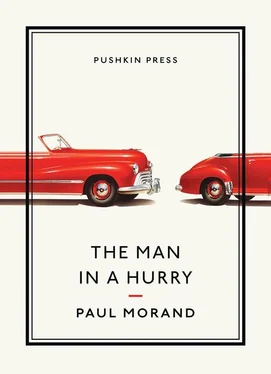“Look at what I’ve found! A Roman column; while I was digging. There must be others!”
His enthusiasm was so obvious that the workers, who were disappointed, but who were moved and felt for him, eagerly took part in the search. The hatchet revealed a further column, supporting a fine stone arch and the beginnings of another; very gradually the continuous festoons of the arcatures were laid bare.
By the end of the day, two-thirds of a Roman cloister, freed of its layers of plaster, stood out against the sky.
Pierre no longer felt weary; alone now, standing in the midst of his newly discovered little basilica, he continued to contemplate the details; within each arch a picture had been formed in the landscape, with either a pine cone blown there by the mistral, a wisp of white foam from the sea, or the branch of a fig tree. Dusk was gradually falling, shadows and a scattering of stars filled the arches, and Pierre could still see the pure movement within them.
Cloîtres silencieux, voûtes des monastères,
C’est vous, sombres caveaux, vous, qui savez aimer .6
“If only Hedwige were here!” he murmured.
How he should love to live here with her, observing the monastic rule — and he the frenetic man! Together they would walk and shelter beneath the vaults; these angles and approaches would shatter their lethargy, divide their meditations into four cardinal points. A cloister, that was what had always been lacking in his life originally, an enclosed space; once they were enclosed within this square, their movements shaped by the collapsed decay of the arches, they would enter into the perfect rhythm.
Two kilometres from the Mas Vieux perched the village of La Penne. A minor road transformed into the bed of a stream ran down to it, spewing out schist and flint stones in torrents. Half a century previously, there were no inhabitants left in this village; fig trees grew freely, loosening the foundations of the houses that were still standing. Amid the collapsed roofs, gypsies and unemployed agricultural workers sometimes dossed down there, making their fires among the broken tiles. One of these nomads, a young Genoese man (who looked like Gambetta, what’s more), had set up camp there. He was a handsome wild bull of a creature, as tall as the Farnese Bull, with a craggy, hairy chest; he had gradually seduced the girls in this land where there was a paucity of men, had introduced some Ligurian blood into these French deserts, and had repopulated the region. He was known as Magali. A tribe of Magalis had been sired biblically among the crevices of these old walls, keeping themselves alive by burning sticks, vine shoots, beams and shutters, poaching, collecting chestnuts, repruning abandoned vines, dynamiting sea bream and sucking goats’ udders like vipers.
Nowadays a hundred or so people lived in the village, all either legitimately or illegitimately Magalis. From being a beggar, the eighty-year-old Magali had become a village worthy; from being a vagabond, the god Terminus. He had married the most successful, the best-endowed of his grandsons to the daughter of an estate agent from Grimaud, a Mademoiselle Estramuri, a parishioner who subscribed to fashion magazines, was imperious by nature and wise in business matters, and who ran an ancient little al fresco restaurant that she had restored, which served snacks and drinks beneath the bamboo awnings to cart drivers, seasonal workers and cork-strippers.
The Magalis rarely left La Penne; they could be seen in the autumn when they came down to the wine-growers’ co-operative in Bormes to tamper with the grapes, or at Le Lavandou station where they caught the train to Toulon. They did not live at all badly, they frequently ate meat, did some fishing for the local lords of the manor, worked listlessly, and were so lazy that they did not even bother to pick up their figs. It was only in September that they became a little busier, during the vendange , when they put a real effort into picking the grapes and producing their alcohol; they all had a fondness for drink. The father especially, puffy and red-faced, was always at the bottle. As his beard grew whiter, old Magali had exchanged his sexual vitality for political influence: a freemason and a bigwig who was listened to, for he made all his tribe vote, he had set up one of his daughters as postmistress at Hyères. With official approval, he kept a watch on neighbouring landowners and made their lives impossible unless an understanding was reached. From deep in the valley at La Penne, he scanned the horizon like a wrecked sailor; in the holiday season he found positions for his granddaughters and great-granddaughters who had not yet found jobs as maids at the summer visitors’ homes; in the winter, thanks to information they had gleaned, and with a deft Latin lightness of touch, he discreetly robbed those houses that had not been entrusted to his care. An innate malevolence, democratic impunity, and the friendliness of the police meant that the Magalis were formidable creators of myths; the girls spread slander as far as Saint-Raphaël, they listened to telephone conversations, read letters by holding them up to the light, and extended the area of their anonymous denunciations as far away as Marseille.
Scarcely had the little cloister of the Mas Vieux seen — or rather, seen anew — the light of day, than the Magalis were alerted by one of their own kin who worked there as a labourer. Madame Magali, née Estramuri, immediately summoned the Magali tribe to a sort of council meeting and gave an outline of the situation. While those best equipped took the hint, the more ignorant ones listened to her respectfully as she emphasized the importance of the discovery and listed all the benefits that could accrue to the village as a result: the cloister would attract crowds of tourists; petrol stations would open surrounded by shops selling postcards and local souvenirs; guides and interpreters would be seen coming to and from La Penne: all this would benefit the Magalis, and the little snack bar that had become the Magali Restaurant would feature on the gastronomic pages of the Guide Michelin . A road suitable for motor cars would have to be built, of course; two kilometres from the Mas Vieux to La Penne, 500 metres from La Penne to the main road. Not a great deal in actual fact; Monsieur Niox, the Parisian millionaire, would put up the money and would make a profit from it. Without further ado, Madame Magali dispatched her husband to the Mas Vieux. Forty minutes later, he had already returned.
“Well?”
“Well, to put it simply, he sent me packing. And he wasn’t even polite. As far as I can see, he doesn’t want to pay for the road.”
The following day and the day after that, the missions and delegations gathered pace. The Magalis offered their work free of charge, then did their best to obtain a departmental grant. Infuriated, Pierre refused to let them in.
Whereupon the pirate-patriarch Magali, a serpent coiled round his staff, turned up in person. Wearing an Alpine hunter’s beret over his grimy locks, his belly squeezed in by an orange-coloured leather cartridge belt that was always empty, his gun slung over his shoulder, and reeking of wine, the elderly tramp, these days as plump as a sow but still a pirate at heart, forced his way in.
From the back of the chicken-run, Pierre was astonished to see this Silenus disguised as Tartarin7 loom up; he wished he could have shut the door, but the Mas Vieux in its state of demolition no longer had any. Magali had already launched into a lengthy utterance that contained everything: welcoming greetings, descriptions of the beauties of the landscape and its hidden dangers, offers of protection against the natives whom Magali knew better than anyone since he was one himself, all embellished with local legends.
Читать дальше












